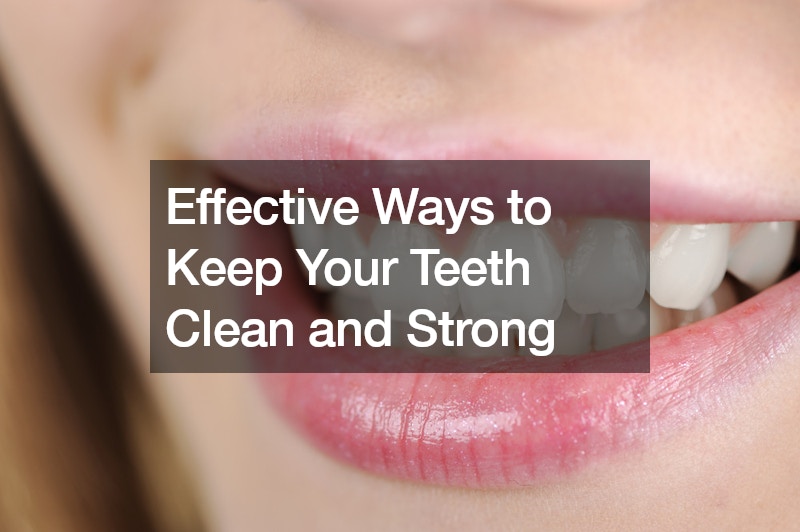Keeping your teeth clean and strong is essential for maintaining overall health. Good dental hygiene helps prevent cavities, gum disease, and other oral health issues. Here are seven effective ways to keep your teeth in top condition.
1. Brush Twice a Day
Brushing your teeth twice a day is a fundamental part of oral hygiene. You should brush once in the morning, ideally right after waking up, and once at night before bed.
Brushing helps remove food particles and plaque that can cause tooth decay and gum disease. For best results, use a fluoride toothpaste, as fluoride strengthens tooth enamel and prevents cavities.
Many dental professionals recommend using an electric toothbrush. While a manual toothbrush can be effective if used correctly, an electric toothbrush often does a better job at removing plaque with less effort. It’s especially helpful for those who might rush through their brushing routine.
2. Floss Daily
Flossing is crucial for cleaning between your teeth where your toothbrush can’t reach. It helps remove plaque and food particles, reducing the risk of cavities and gum disease. Proper flossing technique involves gently sliding the floss between each tooth and curving it around the sides to clean thoroughly.
If traditional flossing is difficult, there are alternatives. Interdental brushes, water flossers, and floss picks can also be effective. The key is to clean between your teeth at least once a day, so find a method that works best for you and stick with it.
3. Use a Fluoride Toothpaste
Fluoride is a mineral that helps prevent tooth decay by making teeth more resistant to acid attacks from plaque bacteria and sugars in the mouth. Using a fluoride toothpaste is an easy way to ensure your teeth get the fluoride they need. It’s a cost-effective measure that can save you from expensive dental treatments in the future.
There are also alternative toothpastes available that use different remineralizing agents, but fluoride toothpaste is widely recommended by dental professionals, including your local dentist.
4. Clean Your Tongue
Many people overlook the importance of cleaning their tongue, even though it plays a crucial role in oral hygiene. The surface of the tongue is covered in tiny bumps and crevices that can harbor bacteria, food particles, and dead cells. These bacteria can contribute to bad breath, also known as halitosis, and can migrate to your teeth and gums, leading to plaque buildup and other dental issues.
Using a tongue scraper or brushing your tongue daily can significantly improve your oral health. Tongue scrapers are specially designed tools that help remove the layer of bacteria and debris from the surface of your tongue. They are typically more effective than using a toothbrush, as they are designed to cover a larger surface area and can reach the back of the tongue more easily. To use a tongue scraper, gently run it from the back of your tongue to the front, rinsing the scraper after each pass.
If you prefer to use your toothbrush, make sure to gently brush the entire surface of your tongue. Use a soft-bristled toothbrush to avoid irritation and ensure you cover all areas of the tongue, including the back where most bacteria tend to accumulate. Regular tongue cleaning not only helps prevent bad breath but also enhances your sense of taste and overall oral hygiene.
5. Use a Fluoride Mouthwash
If you are prone to cavities or have sensitive teeth, using a fluoride mouthwash can provide extra protection. Swish with the mouthwash after brushing and flossing at night, then spit it out. Do not rinse with water afterward to allow the fluoride to coat your teeth overnight. This can help strengthen your enamel and reduce sensitivity.
When choosing a mouthwash, look for one that is pH balanced and not acidic, as acidic mouthwashes can erode tooth enamel over time.
6. Stay Hydrated and Use Xylitol
Drinking water throughout the day helps wash away food particles and bacteria, keeping your mouth clean. Staying hydrated also promotes saliva production, which is crucial for neutralizing acids and protecting your teeth.
Chewing gum or sucking on mints that contain xylitol can also be beneficial. Xylitol is a natural sweetener that helps reduce the levels of harmful bacteria in the mouth and neutralize acids. Using xylitol products after meals can help maintain a healthy pH level in your mouth, reducing the risk of cavities.
7. Maintain a Routine
Consistency is key when it comes to dental care. Brushing and flossing should be part of your daily routine, and it’s important not to skip these habits. Plaque can start to harden into tartar within 24 to 48 hours, which can only be removed by a professional cleaning. Keeping up with your dental hygiene routine helps prevent this and reduces the risk of cavities and gum disease.
In addition to your daily routine, regular visits to your local dentist are crucial. Your dentist can provide professional cleanings and checkups to catch any potential issues early. They can also offer personalized advice based on your specific oral health needs.
Conclusion
Maintaining clean and strong teeth requires a consistent and thorough dental care routine. By brushing twice a day, flossing daily, using fluoride products, cleaning your tongue, and staying hydrated, you can keep your teeth healthy and avoid common dental problems. Remember to visit your local dentist regularly for professional care and guidance. These simple steps can go a long way in ensuring a lifetime of healthy smiles.
.


